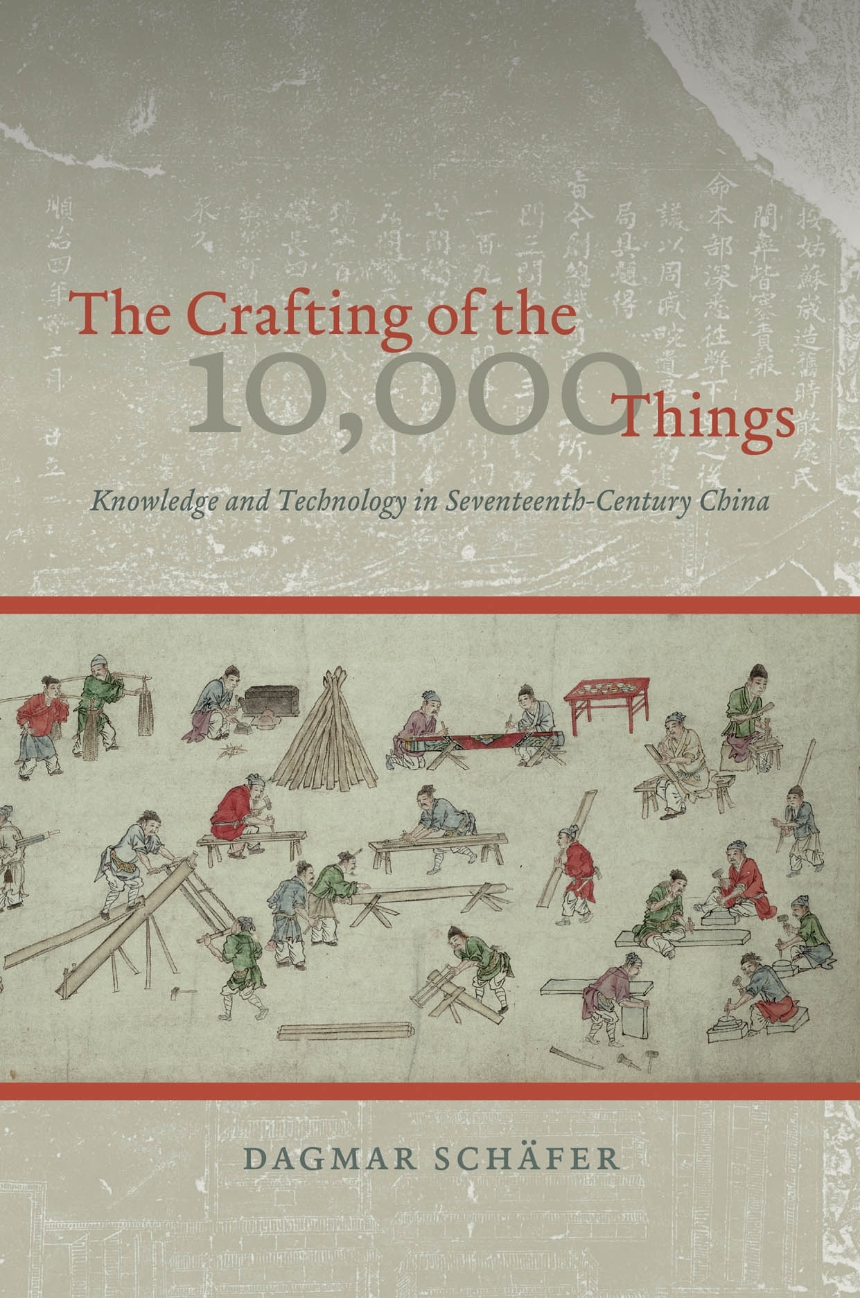The Crafting of the 10,000 Things
Knowledge and Technology in Seventeenth-Century China
The Crafting of the 10,000 Things
Knowledge and Technology in Seventeenth-Century China
The last decades of the Ming dynasty, though plagued by chaos and destruction, saw a significant increase of publications that examined advances in knowledge and technology. Among the numerous guides and reference books that appeared during this period was a series of texts by Song Yingxing (1587–1666?), a minor local official living in southern China. His Tiangong kaiwu, the longest and most prominent of these works, documents the extraction and processing of raw materials and the manufacture of goods essential to everyday life, from yeast and wine to paper and ink to boats, carts, and firearms.
In The Crafting of the 10,000 Things, Dagmar Schäfer probes this fascinating text and the legacy of its author to shed new light on the development of scientific thinking in China, the purpose of technical writing, and its role in and effects on Chinese history. Meticulously unfolding the layers of Song’s personal and cultural life, Schäfer chronicles the factors that motivated Song to transform practical knowledge into written culture. She then examines how Song gained, assessed, and ultimately presented knowledge, and in doing so articulates this era’s approaches to rationality, truth, and belief in the study of nature and culture alike. Finally, Schäfer places Song’s efforts in conjunction with the work of other Chinese philosophers and writers, before, during, and after his time, and argues that these writings demonstrate collectively a uniquely Chinese way of authorizing technology as a legitimate field of scholarly concern and philosophical knowledge.
Offering an overview of a thousand years of scholarship, The Crafting of the 10,000 Things explains the role of technology and crafts in a culture that had an outstandingly successful tradition in this field and was a crucial influence on the technical development of Europe on the eve of the Industrial Revolution.
352 pages | 24 halftones, 1 line drawing | 6 x 9 | © 2011
Asian Studies: East Asia
History: Asian History
Literature and Literary Criticism: Asian Languages
Reviews
Table of Contents
Introduction
Knowing “Things and Affairs” in Premodern China
Nature, Crafts, and Knowing
Chapter 1. Private Affairs
The Ming Dynasty and the Song Family
Childhood and Education
Driving Forces—The Appointment of Chen Qixin
Song’s Writing Campaign
Chapter 2. Affairs of Honor
Knowledge in Terms of qi: Universal Rulings and Rationality
The Truth in Heaven and the Order of qi
The Power of Heaven—Omens and Eclipses
Systems of Value: The Sage-Kings, the Authority of the Past, and Man’s Role
The Knowledge in Crafts
Chapter 3. Public Affairs
Crafts and the Ming State
Man’s Nature (xing) and Talents
Abilities and Education
Social Permeability and the Commercialization of Society: The Merchant
Customs and Habits
Chapter 4. Written Affairs
Rhetoric of Knowledge Inquiry: Texts and Experience
Images, Technology and Argument
Observing the Nature of qi: Theory and Practice in Knowledge Construction
The Complexity of qi Transformations—Composites and Compositions of qi
Chapter 5. Formulating the Transformation
Reading the Signature of yin-yang qi in Gas, Salt, Wind, and Rain
Growth and Decay: Wood, Corpses, and the Proportional Relation of yin and yang
Glitches in the Matrix of qi: The Concepts of Ashes and Particles
Chapter 6. Acoustics
An Anatomy of Sound
The Human Voice
Volume and Velocity
Resonance and Harmony
Conclusion. Leaving the Theater
Epilogue. Aftermath
By Virtue of Friendship: Literary Sponsorship
By Virtue of Position: Outside and Opposition
By Virtue of Loyalty: Moral Obligations
An Artifact in Transmission: The Editions of the Works of Heaven
Writing about Practical Knowledge in the Chinese Literati World
Acknowledgments
Appendix 1. Chinese Dynasties and Various Rulers
Appendix 2. Song Yingxing curriculum vitae
Appendix 3. Editions of the Tiangong kaiwu 天工開物
Notes
Bibliography
Index
Awards
Association for Asian Studies: Joseph Levenson Prize (Pre-1900)
Won
History of Science Society: Pfizer Award
Won
